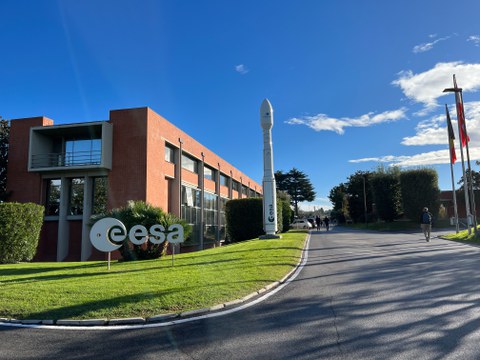Dec 01, 2023
Advancing Earth System Science: Insights from a Workshop on Carbon Cycle and Climate Change

ESA Centre for Earth Observation (ESRIN) in Frascati/Italy
In a bid to address the global challenges posed by population growth, resource scarcity, and climate change, the European Commission (EC) and the European Space Agency (ESA) launched a joint Earth System Science Initiative in January 2020. This initiative aims to harness the power of space-based observation infrastructure to better understand and quantify the carbon cycle's sensitivity to climate change and contribute to the development of sustainable solutions. Recently, we attended a workshop focused on capitalizing on satellite observation capacity, numerical models, in-situ networks, and novel technologies to advance our understanding of the carbon cycle.
Workshop Highlights:
- Diverse Perspectives on the Carbon Cycle: The workshop opened with discussions on the varied views of the carbon cycle, emphasizing the need for convergence in understanding stocks, fluxes, and atmospheric changes. While in-situ observations offer rich and valuable insights, the challenge lies in their representativeness. Satellites provide an alternative perspective, necessitating new approaches beyond traditional methods.
- Integration of Hybrid Approaches: Participants stressed the importance of hybrid approaches, combining acquired knowledge with machine learning and deep learning techniques. High-resolution observations were identified as crucial, along with improvements in data latency and accessibility.
- Immediate Needs for Carbon Community Cohesion: The workshop addressed short-term needs, emphasizing the importance of fostering cohesion within the carbon community. Recommendations included establishing an ESA-EC Carbon-Network, central coordination, and community buy-in.
- Medium-Term Needs - Data: Discussions delved into mechanisms for the continuity of measurements from project/campaign to operational phases. The focus was on addressing scale dependency, regional progress, and ensuring data openness, fairness, and proper communication of uncertainty.
- Medium-Term Needs - Infrastructure and People: Legacy considerations highlighted the need for continuity in infrastructure, investment in the next generation, and engagement with international partners. Participants explored ways to improve fellowship schemes and encourage involvement beyond Europe, particularly in the southern hemisphere.
- Medium-Term Needs - Administrative: Administrative challenges were discussed, including the coordination of projects and calls, visibility of ongoing projects, and the burden on researchers. The workshop suggested new mechanisms, joint EC-ESA calls, and dedicated funding lines to enhance collaboration across clusters.
The workshop provided a platform for stakeholders to collaboratively address the challenges in advancing Earth System Science, particularly in understanding the carbon cycle's role in climate change. The recommendations and insights shared during the workshop underscore the urgency of a cohesive and collaborative effort among scientists, policymakers, and the broader community to address the complex environmental issues facing our planet. The EC-ESA joint initiative stands as a beacon of hope for harnessing scientific advancements to create sustainable solutions for the challenges that lie ahead.
